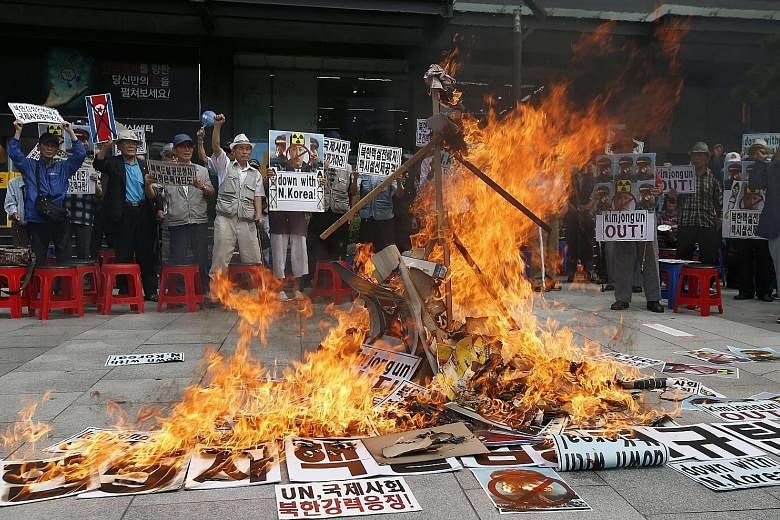GENEVA • North Korea's latest test of an atomic weapon leaves the United States with an uncomfortable choice: Stick with a policy of incremental sanctions that has clearly failed to stop the country's nuclear advances, or pick among alternatives that range from the highly risky to the repugnant.
A hard embargo, in which Washington and its allies block all shipping into and out of North Korea and seek to paralyse its finances, risks confrontations that allies in Asia fear could quickly escalate into war.
But restarting talks on the North's terms would reward the defiance of its young leader, Mr Kim Jong Un, with no guarantee that he will dismantle the nuclear programme irrevocably.
Speaking in Geneva early yesterday morning after announcing a deal with Russia over the Syrian conflict, US Secretary of State John Kerry said the US was willing to negotiate with North Korea, but only if it agreed that the goal of those talks was for it to give up its weapons.
"We have made overture after overture to the dictator of North Korea," he said, including on normalising the country's relationship with the West and a formal peace agreement to replace the 1953 armistice that halted the Korean War but not the state of hostilities.

"All Kim Jong Un needs to do is say, 'I'm prepared to talk about denuclearisation,'" Mr Kerry said.
Mr Kim has rejected that, making it clear that whatever his grandfather and father had intended, his nuclear programme is for deterrence and strength, but not a bargaining chip.
For more than seven years, US President Barack Obama has adopted a policy of gradually escalating sanctions, which the White House once called "strategic patience".
But the test last Friday - the North's fifth and most powerful blast yet, perhaps with nearly twice the strength of its last one - eliminates any doubt that that approach has failed and that the North has mastered the basics of detonating a nuclear weapon.
"This is not a cry for negotiations," said Mr Victor Cha, who served in the administration of former US president George W. Bush and is now a North Korea expert at the Centre for Strategic and International Studies in Washington.
"This is very clearly a serious effort at amassing real nuclear capabilities that (the North) can use to deter the US and others," he said.
South Korea said the nuclear threat from its wayward neighbour is growing fast and called for tough new sanctions from the United Nations Security Council to force it to change tack.
"It is believed that the North's nuclear capability is becoming more advanced to a considerable level, and at a faster pace," South Korean Foreign Minister Yun Byung Se told senior ministry officials, calling for "more and stronger sanctions".
The UN Security Council agreed to start work on just that - even though five sets of UN sanctions since the first nuclear test a decade ago have failed to halt the North's drive for what it insists are defensive weapons.
During a closed-door meeting last Friday, the council strongly condemned the test and agreed to begin drafting a new resolution under Article 41 of the UN Charter, which provides for sanctions.
In Seoul, dozens of protesters burned an effigy of Mr Kim and called for "strong retaliation", including pre-emptive attacks on the North's nuclear complex. Some newspapers were equally scathing. "South Korea left unguarded before nuclear maniac," read the headline of the top-selling Chosun Ilbo.
But the North's ruling party newspaper vowed yesterday not to submit to US nuclear "blackmail", and described South Korean President Park Geun Hye as a "dirty prostitute" for working with US forces.
NEW YORK TIMES, AGENCE FRANCE-PRESSE

